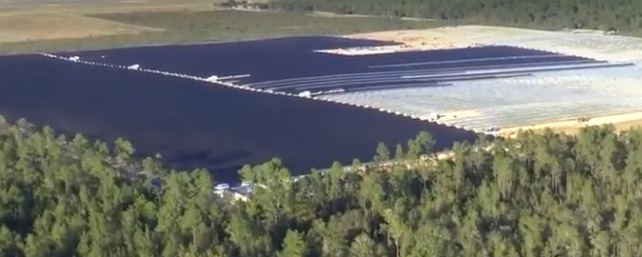Promptly after President Trump enacted new tariffs on imported solar panels last month, Jacksonville City Council approved $24.2 million in incentives to entice a foreign solar panel company to begin manufacturing locally.
According to the Florida Times Union, the still-unnamed company has pledged to create 800 jobs by the end of next year at its manufacturing and assembly buildings in Jacksonville. The incentives are in the form of tax breaks during the next ten years on the property of the two sites.
The tariffs were recommended to the White House by the U.S. International Trade Commission based on complaints from American solar manufacturers that cheap imports were damaging their business. The largest American solar manufacturer, based in Oregon, has also announced plans to expand business as a result of the new tariffs.
The Jacksonville City Council action comes just months after the Jacksonville Utility Authority (JEA) unanimously approved a major solar-power program that will invest millions expanding its use of solar panels.
Jacksonville’s move to attract a solar manufacturing business is in line with what is happening across the US.
The day Trump signed the proclamation on new solar tariffs, Texas-based solar module manufacturer Mission Solar Energy announced that it’s ramping up production to meet 2018 demand. The company — which had to lay off workers in early 2017 — is also hiring 50 new employees to shift production line operations to a 24/7 schedule, stating that this is just “the first phase in the plan for production increase.”
Also, Oregon-based SolarWorld Americas said it is committed to ramping up production, however, and will finish hiring 200 workers by the end of the year. The company initiated manufacturing again last fall as the trade case advanced.
Domestic solar module makers in particular have been bolstered by the president’s decision to allow for 2.5 gigawatts of tariff-free solar cells to be imported each year, for the four-year duration of the trade remedy.
A group of 10 American crystalline-silicon solar PV (CSPV) module manufacturers, including Mission Solar and Solaria, as well as Tesla, urged the president to implement a trade remedy that would allow for enough tariff-free solar cells to support and grow the domestic solar module manufacturing industry — and they effectively got their wish.
Despite these announcements, some or doubtful about the positive impact of the solar panel tariff.
The Solar Energy Industries Association (SEIA) calculates the trade remedies will trigger 23,000 job losses this year alone across the broader solar industry, which currently employs some 260,000 workers. The Wall Street Journal editorial board wrote this week that “Mr. Trump’s tariffs are an economic blunderbuss that will hit America’s friends abroad and Mr. Trump’s forgotten men and women at home.”

